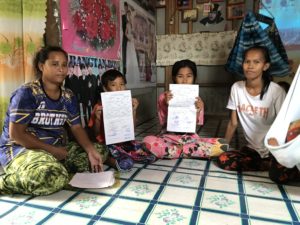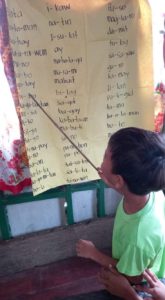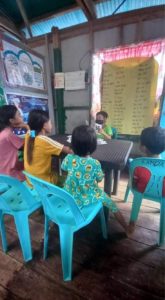For many Sama Bajau children, education is a luxury.
The Sama Bajau people – indigenous seafarers who travel between the Philippines, Malaysia, and Indonesia – are often without official identification documents due to their frequent mobility in search of livelihood opportunities and a chance to a better life. While this has been part of their way of life for generations, the lack of identification documents has also prevented them access to basic protection and social services, including education. This was a reality that Charlie, an 11-year-old Grade 3 student, has lived in for most of his young life.
“I was sad because I barely knew how to read and write when we were told that classes will be put on hold because of the pandemic.”
Charlie, along with his mother, father, and younger brother, were displaced during the 2013 Zamboanga Siege and were granted shelter in Vale Vista, Kasanyangan in Zamboanga City. Since fleeing, his father has worked as a karo boy – one who pushes wooden carts for people with heavy items from the public market – and his mother has stayed at home, being the primary carer for the family.
Charlie’s mother already knew of CFSI from past projects supporting Sama Bajaus, of which she and other family members were beneficiaries of. “We often saw staff in the transitory sites and evacuation centres before. I, for one, only got my birth certificate at 36 years old along with my husband and his siblings because of CFSI. I think birth registration is really important because it enables access to services. For example, my niece, whose mother died giving birth to her, was not able to enrol in Grade 1 because she was not registered at birth, but I was able to have her civil documentation processed with the help of CFSI.”

Charlie, 2nd from left with his mother and cousins beside him
CFSI’s support for Charlie’s family and community have continued through the promotion of free and safe education for Sama Bajau children, which includes tutoring classes for in-school children and youth. Education has become increasingly challenging due to the pandemic and its related restrictive measures over the last two years, and Charlie and his brother Senri, currently in Grade 3 and Grade 2, respectively, have felt the effects of this first-hand. At the height of the COVID-19 pandemic, both boys had to stop their schooling due to the closing of schools.
“Sometimes, my brother Senri passed modules without answers because we did not know where to get help.”
“I felt bad when the pandemic hit our city and it prevented us from going to school. I missed my classmates and daily school activities. I was sad because I barely knew how to read and write when we were told that classes will be put on hold because of the pandemic.”

Charlie teaching his classmates basic reading.
Like many Sama Bajau children, Charlie and Senri had limited access to educational support, which made learning and keeping up with school much more challenging; especially with the absence of face-to-face classes.
“My mother reached Grade 6, but she also gets busy with attending to the household chores and sometimes cannot teach us. My father did not go to school because he had to work when he was young to support his family. My brother was supposed to be in Grade 1 when the schools suddenly closed, and because he was not enrolled, he also did not know how to read and write. When the blended learning was implemented, answering the modules was hard because we were not really taught the lectures that we needed to understand and answer the modules. Sometimes, my brother Senri passed modules without answers because we did not know where to get help.”
“I want to be a doctor when I grow up and serve other children from IP communities.”
Seeing a great need to ensure that Sama Bajau children are not left behind in school, CFSI, with support from EDUCO Philippines, implements the Sama Bajau Education Support Project Phase Two (SBESP/2) to support them through tutoring classes and the provision of learning materials.
Under the SBESP/2, Charlie and Senri’s birth certificates were processed, which has enabled them to enrol in school. Since attending the tutoring sessions, Charlie has been more outgoing and has started to become a leader, growing more confident in teaching his peers to learn how to read and write – two vital skills that he used to dream of for himself and his brother. He says he feels grateful for the tutoring sessions because he is able to learn and play with his friends and other children in the same grade level in what somehow resembles a school setting.
Sharing what he learns in school with his little brother Senri, Charlie’s interest in learning has grown, and he is now one of many children who want to teach other children how to read and write. Upon receiving school materials from EDUCO Philippines, he was very happy as he expressed that it was his first time in years to have received such materials for learning.

Charlie teaching his classmates numbers.
“I want to be a doctor when I grow up and serve other children from IP communities. There are many children in my community who get sick but are unable to access medical care due to poverty, and some are also dying without even knowing why or how. I hope more children can benefit from the tutoring sessions so that more can have their dreams realised through education.”
“I think people should know that Sama Bajau children also need help in accessing education and services that are important for their needs and growth. Also, more people should know of CFSI and the work that they do because it helps a lot of people. Maybe they can also help in having more projects for children.”
Wars, discrimination, and the cost of climate change that have been felt across the Sama Bajaus for years have pushed them into vulnerability and worse – invisibility. For Charlie, Senri, and other children like them, birth registration and accessible education are life-changing – ensuring that they can access basic social welfare services, protecting them from statelessness and further discrimination.
CFSI joins Charlie and Senri in hoping for their people’s bright future – a future where all of them are seen and protected, and where education is no longer a luxury, but a right felt and exercised by everyone.
*Direct quotes have been translated from the local dialect of Sinama to English.

